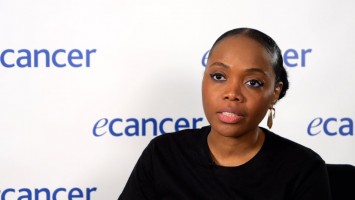As you know, we have a big problem in Africa regarding cancer. We expect in the next twenty years cancer deaths should about double from where they are right now. So this is a major public health problem that needs to be dealt with. The purpose of my presentation today was to talk about how we generate the knowledge that is needed to address this big problem through collaboration and research and how we begin to create the tools and the scientific background, scientific basis, to address cancer to decrease the number of deaths that we are expecting to see in the coming years.
What avenues are you pursuing?
The main thing that needs to be done is that we need to bring people together who are currently fairly siloed. The clinicians in Africa, scientists in Africa, people who work in areas that are all very much related to address the problem but don’t talk to each other as well as they could. It’s usually not out of lack of interest, it’s usually because people are quite busy. The tools that are needed to make scientific research happen have not been invented or have not been optimised for the African setting and so we need to make sure that we have processes in place, protocols in place and means of communication in place so that when we try to address a cancer problem in Africa the people, the people who want to work on these problems in Africa, actually can make progress.
What are you doing to make this happen?
The areas that have to be addressed include setting up academic systems that allow African researchers to have a pathway towards success. There needs to be tenure track kind of models, research track models, so that an individual who wants to do research has a ladder for success and that those ladders for success are supported by institutions, that the institutions reward research and the public health kinds of activities beyond just their clinical activities. So these are things that take institutional change and buy-in from institutions, so that’s one area.
There need to be processes and protocols that are standardised so that people are doing work that is at a very high level and is comparable, can be understood and compared across different centres so that the methods that are used for doing research and for making public health impact are viable and repeatable across different settings.
What are the most important things which aid this process?
Through working in Africa on cancer research for almost twenty years we’ve had a few lessons that we’ve learned that help us, that in our experience really make a difference. One is that you have to have a local influential PI, someone who is a champion for the work that needs to be done who has contacts both at higher levels – ministries of health or heads of universities or other institutions – but also who is willing to foster the careers of junior investigators and build teams. That’s an incredibly important thing and a difficult thing because there isn’t always a person like that. But when you have that person and when you can foster their activities they can really make a huge difference.
The second thing that needs to happen is that institutions need to buy in to the notion that cancer research and cancer translational activities are important. So they need to commit. They need to commit resources; they need to commit space or time. They need to understand that these investments that they make will pay off in different ways. So that takes time to convince the institutions how to make these investments and that these investments are worth their while.
So those kinds of activities set up the groundwork for having the kind of work that will make an impact on cancer. But on top of that there need to be systems for getting resources, laboratory resources or individuals who are trained, students, the actual people and the resources that need to be there to do the research. So there are a whole series of pieces to that – there are logistical issues, ethics issues, financial issues that need to be set up in terms of systems that people and institutions can use to build these processes.








